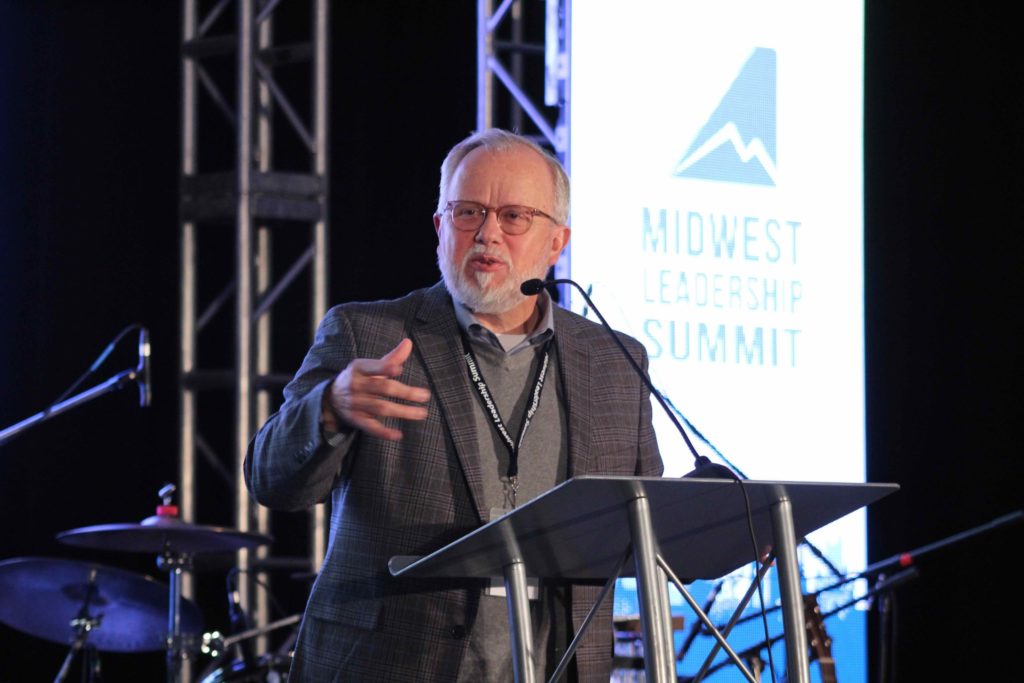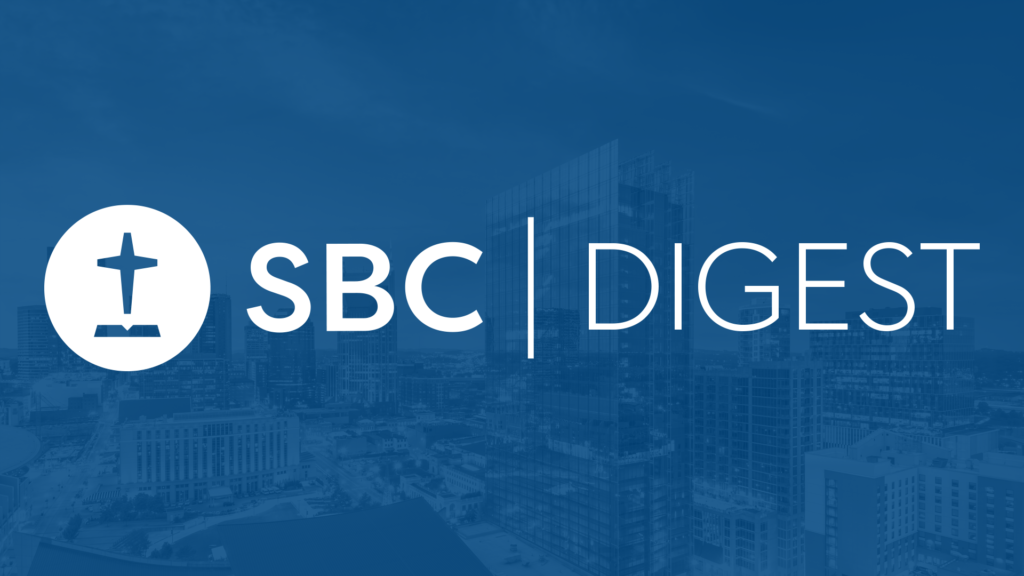
Litton salutes Midwest leaders at biennial summit
By Eric Reed/Illinois Baptist
SPRINGFIELD, Ill. (BP) – As nearly 1,000 church leaders from the Midwest convened in Illinois, Southern Baptist Convention President Ed Litton saluted organizers and those in attendance for the unique regional event, before speaking briefly about pressures facing the convention.
 “You’re a testimony to the nation,” Litton said. “If all our regions would be so united together to perfect our skills and each other, that would be amazing.”
“You’re a testimony to the nation,” Litton said. “If all our regions would be so united together to perfect our skills and each other, that would be amazing.”
He also praised Southern Baptist Disaster Relief volunteers, citing the example of Michigan teams working in Colorado after wildfires. “At our best, we are brothers and sisters in Christ, working together to spread the Gospel,” he said.
Unity was an underlying theme in Litton’s brief comments.
“My hope for Southern Baptists to discover the power of crying out to God,” he said. “Even with ‘our stains,’ past stains and abuse – God is moving through Southern Baptists to address these stains. Let’s make sure first to deal with the source of the stain.”
Litton was one a variety of representatives of SBC entities scheduled to appear at the Midwest Leadership Summit Jan. 18-20. Hance Dilbeck, incoming CEO of GuideStone Financial Resources, one of the sponsors of the summit, praised his predecessor, O. S. Hawkins, and his efforts to expand Mission: Dignity, which supports financially strapped retired pastors and their widows. “I want you all to know we have a heart for shepherds.” Dilbeck said.
He then urged pastors to support Mission: Dignity, even as they give attention to their own wellbeing.
The event, which meets every two years, brings together church leaders from 12 states and nine Baptist conventions. About 1,000 leaders were registered, but the numbers dropped slightly as COVID cases rose. Still, those attending will choose six breakouts from among 70 scheduled, in addition to three plenary worship sessions, prayer times and missions focus.
The Midwest Leadership Summit began as the North Central States Rally as part of a church planting movement in the 1950s to address the unique ministry challenges faced by churches outside the South. “God is at work in the Midwest,” said Jeremy Westbrook, recently elected Executive Director of the State Convention of Baptists in Ohio, who emceed the large group sessions. “That’s one of the blessings of the summit, we get to talk about what God is doing in our churches.”
The state convention partners are Dakota Baptist Convention, Illinois Baptist State Association, State Convention of Baptists in Indiana, Baptist Convention of Iowa, Kansas-Nebraska Convention of Southern Baptists, Baptist State Convention of Michigan, Minnesota-Wisconsin Baptist Convention, Missouri Baptist Convention, and the State Convention of Baptists in Ohio.
Each plenary session also featured a practitioner or planter from the region. Kirk Kirkland, planter and pastor of Revive City Church in Cincinnati, told of ministry among homeless and addicted people—and seeing God at work.
“Yes, ministry in the Midwest can be hard. Ministry in the city, ministry in the pandemic. We have moved our location 11 times…. But it’s really hard when you start getting job offers,” Kirkland told the crowd that included many pastors. “The gospel is able to break up the hardest of soils,” he said. “God can give you the grace of grit.”
ERLC Explainer: The Boston flag case
By ERLC Staff
Tuesday (Jan. 18), the U.S. Supreme Court heard oral arguments in Shurtleff v. Boston, a key First Amendment case before the court this term. Here are some details about the case:
What is this case about?
The City of Boston manages three flagpoles in front of its city hall. Typically, those flagpoles fly the American flag and the POW/MIA flag on one flagpole, the Commonwealth of Massachusetts flag on the second, and Boston’s own local flag on the third. The city occasionally, upon request and approval, will fly another flag for a brief period of time rather than Boston’s flag, typically in conjunction with an event happening at City Hall.
In 2017, Harold Shurtleff, through his organization, Camp Constitution, petitioned to host an event at Boston City Hall, raise a Christian flag, and have members of the clergy speak about the religious history of Boston, the Commonwealth of Massachusetts and the Constitution.
The city denied Camp Constitution’s request to fly the Christian flag. According to the petition, “For the twelve years preceding Camp Constitution’s request, from June 2005 through June 2017, the City approved 284 flag raising events, with no record of a denial.” Gregory T. Rooney, Commissioner of Boston’s Property Management Department, who reviews the requests, ultimately decided to deny Camp Constitution’s request because “we didn’t have a past practice of allowing religious flags, and we weren’t going to allow this flag raising.”
Following this denial, Camp Constitution sued the City of Boston claiming a violation of the organization’s First Amendment rights. Both the district court and U.S. Court of Appeals for the First Circuit have ruled in favor of the City.
Why is this case important?
This case has the potential to further limit the scope of the Establishment Clause and may have implications for religious speech at other limited public forums such as schools, city halls, and public libraries.
As noted by Becket Law, Boston’s city officials “have an outdated understanding of the Establishment Clause [that] often ban[s] religious elements from the public square simply because they are religious.”
They continue: “This error isn’t limited to Boston. For years, government officials (with approval from lower courts) have been censoring religious expression from the public square in fear of violating the Constitution. Many mistakenly think that exclusion of religion is the safest option. This mistake goes beyond a flagpole – similar reasoning has been used to prohibit religious groups from advertising on trains and buses, exclude religious schools from generally available funding programs, and even deny FEMA aid to churches and synagogues damaged by hurricanes.”
This case presents the Supreme Court with an important opportunity to affirm the First Amendment rights of religious organizations and clarify understanding of the Establishment Clause.
How has the ERLC been involved?
The ERLC joined an amicus brief asking the Supreme Court to rule in favor of Camp Constitution. The brief argues that the City of Boston is violating the Free Exercise Clause and Establishment Clause and is wrongly discriminating against the speech of a religious organization. The Supreme Court rightly agreed to hear oral arguments in the case and the ERLC is hopeful that the court will rule against the exclusion of religious expression in public forums.

















